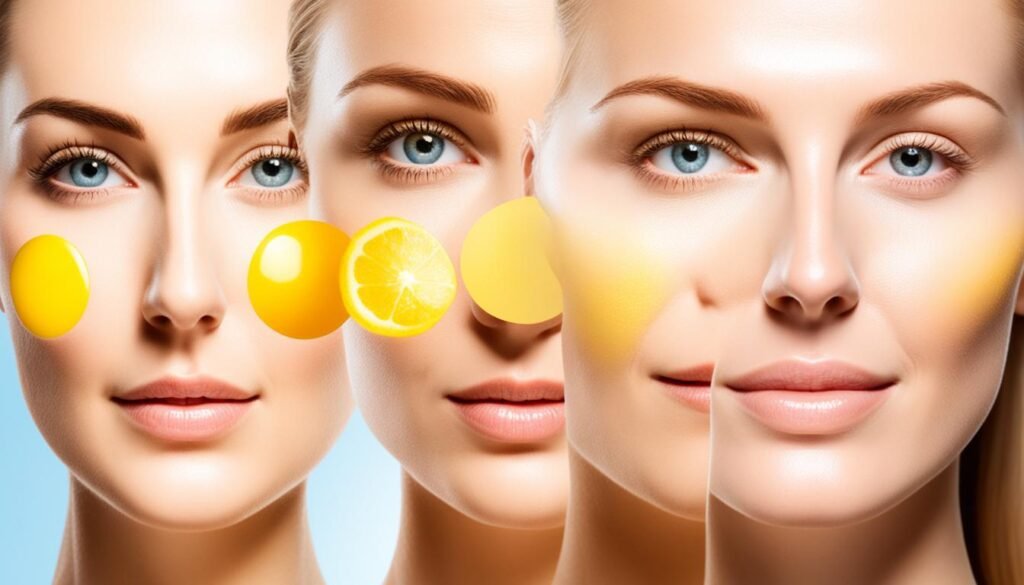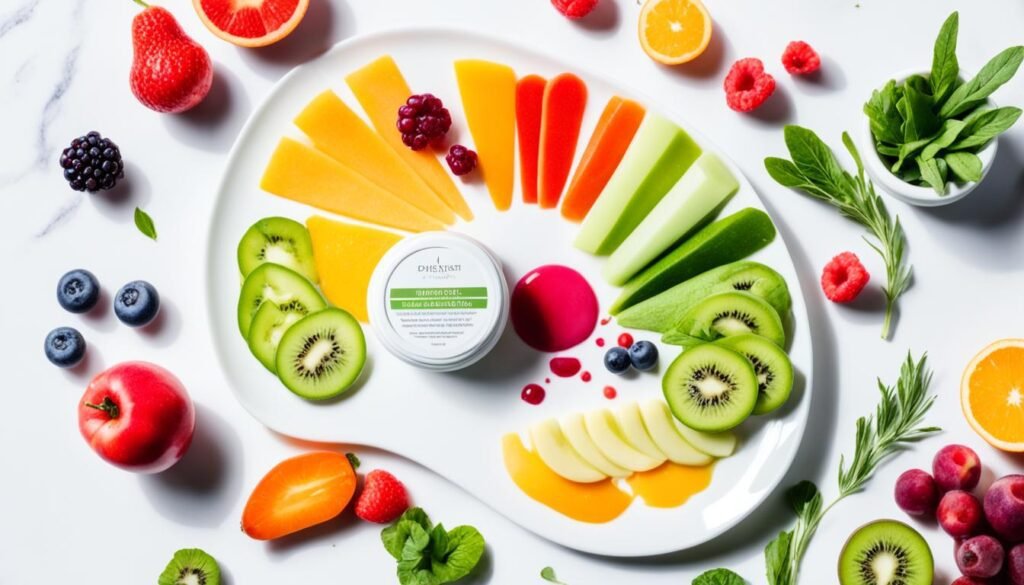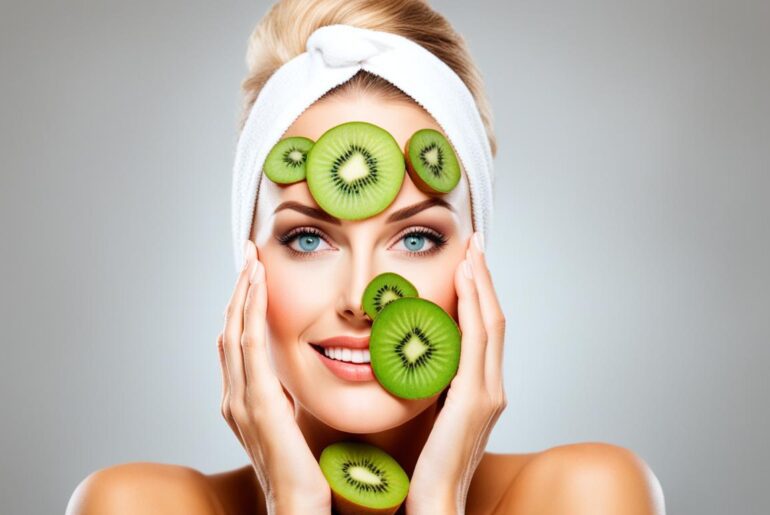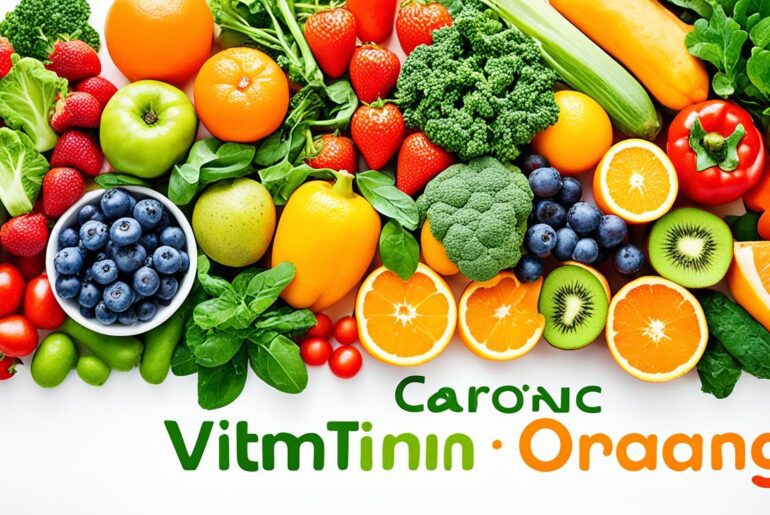Have you ever wondered what truly lies beneath the surface of healthy, glowing skin? Is it genetics, skincare products, or something else entirely? While we often focus on external factors, the truth is that essential vitamins play a crucial role in nourishing and protecting our skin from within. So, let’s delve deeper into the world of skin health vitamins, uncovering the key nutrients needed for a radiant complexion.
- Omega-3 fatty acids, vitamin A, vitamin C, zinc, and selenium are essential vitamins for healthy skin.
- These vitamins contribute to skin elasticity, hydration, rejuvenation, protection, and overall skin health.
- Incorporate foods rich in these vitamins into your diet for optimal skin nourishment.
- You can also find skincare products enriched with vitamins to enhance your skincare routine.
- Consult with a healthcare professional for personalized guidance on vitamin supplementation for your skin.
Omega-3 Fatty Acids for Skin Health
Omega-3 fatty acids are a powerhouse for maintaining the health of your skin. These essential nutrients provide numerous benefits, including skin hydration, elasticity, and anti-inflammatory effects. Incorporating foods rich in omega-3 fatty acids into your diet can promote clear and glowing skin by reducing inflammation, improving hydration, and enhancing skin elasticity.
Some excellent sources of omega-3 fatty acids include:
- Fatty fish like salmon and sardines
- Flaxseeds
- Legumes
By including these foods in your meals, you can naturally boost your intake of omega-3 fatty acids and support your skin’s health and vitality.
The Power of Omega-3 Fatty Acids
Omega-3 fatty acids work wonders for promoting clear and radiant skin. They are known for their ability to:
- Reduce inflammation: Inflammatory skin conditions, such as acne and eczema, can greatly benefit from the anti-inflammatory properties of omega-3 fatty acids.
- Improve skin hydration: Moisturized skin is key to achieving a healthy and radiant complexion, and omega-3 fatty acids help lock in moisture.
- Enhance skin elasticity: By maintaining the integrity of your skin’s structure, omega-3 fatty acids contribute to improved elasticity, reducing the appearance of fine lines and wrinkles.
With the help of omega-3 fatty acids, you can give your skin the nourishment it craves for a naturally beautiful and glowing complexion.
Vitamin A for Skin Rejuvenation

Vitamin A is an essential nutrient for skin rejuvenation and combating signs of aging. This powerful vitamin stimulates the production of collagen, a protein that maintains the skin’s firmness and elasticity. By increasing collagen levels, vitamin A helps to reduce the appearance of wrinkles, repair damaged skin cells, and improve overall skin texture.
One way to incorporate vitamin A into your skincare routine is through dietary sources. Foods rich in vitamin A include eggs, leafy dark greens, and fortified dairy products. Consuming these nutrient-dense foods can provide your body with the necessary vitamins for skin rejuvenation.
Additionally, topical applications of vitamin A, such as retinoids, can be effective in promoting skin rejuvenation. Retinoids work by stimulating cell turnover, promoting the growth of new skin cells, and reducing the appearance of fine lines and wrinkles.
The Benefits of Vitamin A for Skin Rejuvenation:
- Stimulates collagen production, improving skin firmness and elasticity
- Reduces the appearance of wrinkles
- Repairs damaged skin cells
- Improves overall skin texture
When using topical vitamin A products, it’s important to follow usage instructions and consult with a skincare professional if you have any concerns or specific skin conditions. Vitamin A can be beneficial for skin rejuvenation, but it’s essential to find the right balance and use products suitable for your skin type and needs.
By incorporating vitamin A into your diet and skincare routine, you can enhance your skin’s rejuvenation process and achieve a more youthful and radiant complexion.
“Vitamin A is a game-changer when it comes to skin rejuvenation. It not only reduces the appearance of wrinkles but also improves overall skin texture, making it a must-have vitamin for anti-aging skincare.” – Dr. Rebecca Johnson
Vitamin C for Skin Brightening
Vitamin C is a powerful antioxidant that is highly beneficial for achieving clear and bright skin. Its properties not only protect the skin from environmental stressors but also contribute to skin brightness and radiance. ”
One of the main benefits of vitamin C for skin is reducing the production of melanin, the pigment responsible for dark spots and hyperpigmentation. By inhibiting melanin production, vitamin C helps to even out the skin tone and minimize the appearance of discoloration. This can lead to a more uniform complexion and increased skin brightness.
Vitamin C also plays a role in collagen synthesis, an essential protein for maintaining skin elasticity. As we age, collagen production naturally decreases, resulting in the formation of fine lines and wrinkles. By promoting collagen production, vitamin C can help improve skin elasticity and reduce the signs of aging, further enhancing the overall clarity and appearance of the skin.
Incorporating vitamin C into your skincare routine can be done through both dietary sources and topical application. Citrus fruits like oranges and grapefruits, berries such as strawberries and blueberries, and leafy greens like kale and spinach are excellent dietary sources of vitamin C. Including these foods in your diet can provide your body with the necessary nutrients to support skin brightness and clarity.
In addition to consuming vitamin C through your diet, using skincare products with vitamin C can deliver targeted benefits to your skin. Vitamin C serums and creams are popular options for topical application. When applied to the skin, these products can help enhance skin brightness, fade dark spots, and improve overall skin radiance.
It’s important to note that vitamin C is sensitive to light and air, so it’s essential to store skincare products containing vitamin C in opaque containers and keep them away from direct sunlight. This will help ensure the stability and efficacy of the vitamin C in the product.
Overall, vitamin C is a valuable nutrient for achieving clear and bright skin. By incorporating foods rich in vitamin C into your diet and using skincare products with vitamin C, you can support your skin’s brightness, reduce pigmentation, and improve overall skin tone and clarity.
Zinc for Skin Healing

Zinc is an essential mineral that plays a crucial role in promoting skin healing and regeneration. It provides various benefits for your skin, including stabilizing cell walls, speeding up wound healing, and promoting healthy skin cell growth. Zinc also possesses antioxidant properties that protect your skin from UV damage and inflammation.
When your skin is injured or damaged, zinc helps to accelerate the healing process by supporting the formation of new skin tissue. It aids in the production of collagen, which is a vital protein for maintaining the strength and integrity of your skin. Additionally, zinc’s anti-inflammatory properties help reduce redness and swelling associated with wounds and skin conditions.
You can incorporate zinc into your diet by consuming foods rich in this mineral, such as seafood, legumes, nuts, and whole grains. These natural sources of zinc provide your body with the nutrients it needs to support the skin healing process.
“Zinc is an essential mineral that plays a crucial role in promoting skin healing and regeneration.”
In addition to dietary sources, zinc supplements are also available for those who may have a deficiency or who require additional support for skin healing. However, it is important to consult with a healthcare professional before starting any supplements to ensure proper dosage and usage.
Remember, always consult with a healthcare professional before starting any new supplement or treatment regimen.
| Natural Sources of Zinc | Zinc Content (per 100 grams) |
|---|---|
| Seafood (oysters, crab) | 13-90 mg |
| Legumes (chickpeas, lentils) | 1-3 mg |
| Nuts (cashews, almonds) | 1-3 mg |
| Whole Grains (quinoa, oats) | 2-3 mg |
By incorporating zinc into your diet and considering supplements under professional guidance, you can support your skin’s healing process and promote its overall health. Ensure that you follow a well-rounded skincare routine and prioritize a healthy lifestyle to optimize the benefits of zinc for your skin.
Selenium for Skin Protection
In addition to omega-3 fatty acids, vitamin A, vitamin C, and zinc, another essential nutrient that plays a crucial role in skin protection is selenium. Selenium acts as a powerful antioxidant, safeguarding the skin against UV damage and oxidative stress. By enhancing the antioxidant activity in the skin, selenium helps reduce the risk of skin cancer and promotes overall skin health.
Selenium-rich foods can be easily incorporated into your diet to provide your skin with the necessary protection against environmental stressors. Some excellent dietary sources of selenium include Brazil nuts, seafood, and whole grains. By consuming these selenium-rich foods, you can help maintain the health and vitality of your skin.
Protecting your skin with selenium not only contributes to its overall health but also adds an extra layer of defense against the harmful effects of the sun and other environmental factors.
Vitamin D for Skin Health

Vitamin D is an essential nutrient for maintaining healthy skin. It plays a crucial role in maintaining the skin’s integrity, boosting immune function, and reducing inflammation. Additionally, vitamin D has been found to improve conditions such as psoriasis. Adequate exposure to sunlight, consumption of fortified foods, and dietary supplements are all sources of this important vitamin.
When our skin is exposed to sunlight, it naturally produces vitamin D. This process is essential for our overall skin health. Vitamin D helps maintain the strength and structure of our skin, ensuring it functions optimally in protecting our body from external factors.
In addition to maintaining the skin’s integrity, vitamin D also plays a significant role in supporting our immune system. By boosting immune function, vitamin D helps the skin defend against harmful pathogens and reduces the risk of infection or inflammation.
Moreover, vitamin D possesses anti-inflammatory properties, which are beneficial for individuals with skin conditions like psoriasis. It can help reduce the severity of symptoms and improve overall skin health.
To ensure sufficient levels of vitamin D, it’s essential to have a balanced approach. Sun exposure is a natural and primary source of vitamin D. Spending time outdoors and allowing sunlight to touch our skin can contribute to the production of this vitamin. However, it’s crucial to practice sun safety and avoid prolonged exposure during peak hours when the sun is strongest.
In addition to sun exposure, fortified foods can provide vitamin D. These include certain dairy products, cereals, and orange juice. Furthermore, dietary supplements are also available to ensure adequate intake of this essential vitamin.
By incorporating vitamin D into our daily routines, we can support our skin’s health and overall well-being. Whether it’s through sun exposure, fortified foods, or supplementation, maintaining sufficient levels of vitamin D is crucial for optimal skin health.
The Benefits of Vitamin D for Skin Health:
| Benefits | Explanation |
|---|---|
| Promotes skin integrity | Vitamin D helps maintain the strength and structure of the skin, ensuring its protective function |
| Boosts immune function | By supporting the immune system, vitamin D helps the skin fight against pathogens and reduce the risk of infection |
| Reduces inflammation | Vitamin D possesses anti-inflammatory properties, which can be beneficial for individuals with skin conditions like psoriasis |
Ensuring adequate levels of vitamin D is essential for achieving and maintaining healthy skin. Incorporate sunlight exposure, fortified foods, or dietary supplements to support your skin’s overall health and well-being.
Incorporating Vitamins into Your Skincare Routine

In addition to consuming vitamins through your diet, you can also incorporate them into your skincare routine. Many skincare products contain vitamins, such as vitamin C and vitamin E, which provide targeted benefits for the skin. Look for serums, moisturizers, and face oils enriched with vitamins to nourish and protect your skin. These products can help address specific skin concerns and enhance the effectiveness of your skincare routine.
Vitamins play a vital role in promoting skin health, elasticity, hydration, and protection against environmental stressors. Incorporating them into your skincare routine can provide your skin with the necessary nourishment and protection it needs to maintain a radiant and healthy complexion.
Benefits of Incorporating Vitamins into Your Skincare Routine
“Using skincare products enriched with vitamins can help improve the overall appearance of your skin by addressing specific concerns and providing targeted benefits.”
- Vitamin C: Brightens the skin and reduces the appearance of dark spots and hyperpigmentation.
- Vitamin E: Provides antioxidant protection and helps to moisturize and soothe the skin.
- Vitamin A: Promotes skin rejuvenation and diminishes the appearance of wrinkles and fine lines.
- Vitamin B3: Improves skin texture, reduces redness, and strengthens the skin’s barrier function.
By incorporating skincare products enriched with these vitamins into your daily regimen, you can target specific skin concerns and enhance the overall health and appearance of your skin.
Whether it’s a vitamin C serum for brightening, a vitamin E moisturizer for nourishment, or a vitamin A-based retinol cream for anti-aging benefits, there are various options available to incorporate vitamins into your skincare routine. These products are formulated to deliver the vitamins directly to your skin, providing optimal results.
When selecting skincare products, pay attention to the ingredients list and look for specific vitamins that align with your skin concerns. Consider consulting with a dermatologist or skincare professional to determine the best products for your skin type and needs.
Remember, consistency is key when incorporating vitamins into your skincare routine. Use the products regularly and follow the recommended application instructions for the best outcomes. Combined with a healthy diet, proper hydration, and adequate sun protection, incorporating vitamins into your skincare routine can help you achieve and maintain healthy, glowing skin.
Consult Your Doctor for Personalized Advice

While incorporating vitamins into your diet and skincare routine can benefit your skin, it’s essential to consult with your doctor or a healthcare professional for personalized advice. They can assess your specific needs, recommend appropriate vitamin supplements if necessary, and ensure that they do not interfere with any existing medical conditions or medications you may be taking. It’s crucial to prioritize your overall health and well-being when considering vitamin supplementation for your skin.
Why Consultation is Important
Consulting a healthcare professional before starting any new supplements or making changes to your skincare routine is important. They have the knowledge and expertise to guide you on the best approach for your skin health. Here are some key reasons why a consultation is necessary:
- Assessment of specific needs: A doctor can assess your individual skin health needs and determine which vitamins would be most beneficial for you. They can consider factors such as age, lifestyle, and any existing skin conditions to provide tailored advice.
- Recommendation of appropriate supplements: In some cases, it may be necessary to supplement your diet with vitamin supplements to meet your skin’s nutritional requirements. A healthcare professional can recommend the right supplements and dosages based on your specific needs.
- Monitoring existing medical conditions: If you have any existing medical conditions, it’s important to ensure that the vitamins you plan to take do not pose any risks or interact negatively with your current medications. Your doctor can provide guidance on avoiding any potential complications.
“Consulting with a healthcare professional is crucial for receiving personalized guidance on incorporating vitamins into your skincare routine. They can assess your individual needs, recommend appropriate supplements, and ensure that they do not interfere with any existing medical conditions or medications.”
Vitamin Supplementation for Skin Health
When considering vitamin supplementation for your skin, it’s important to understand that supplements should complement a balanced diet rather than replace it. While vitamins can provide additional support, they cannot replace the nutrients obtained from a healthy and varied diet.
Consulting a healthcare professional can help you determine if vitamin supplements are necessary and guide you on the appropriate dosage. They can also advise on the duration of supplementation and any potential side effects to watch out for.
| Vitamin | Benefits for Skin | Food Sources |
|---|---|---|
| Vitamin A | Supports skin rejuvenation, reduces wrinkles, and improves texture. | Eggs, leafy dark greens, fortified dairy products |
| Vitamin C | Brightens the skin, reduces dark spots, and promotes collagen production. | Citrus fruits, berries, leafy greens |
| Zinc | Facilitates skin healing, helps repair damaged cells, and reduces inflammation. | Seafood, legumes, whole grains |
| Selenium | Protects the skin from UV damage, enhances antioxidant activity. | Brazil nuts, seafood, whole grains |
Remember, every individual’s skin health needs are unique, so it’s important to consult with a healthcare professional for personalized advice. They can guide you on incorporating the right skin health vitamin supplements and ensuring the best outcome for your skin.
Conclusion
In conclusion, maintaining healthy skin requires proper nutrition and adequate intake of essential vitamins. Incorporating vitamins such as omega-3 fatty acids, vitamin A, vitamin C, zinc, and selenium into your diet and skincare routine can have significant benefits for your skin health. These vitamins play vital roles in promoting skin elasticity, hydration, and protection against environmental stressors.
By nourishing your skin with these essential vitamins, you can achieve a radiant and healthy complexion. Omega-3 fatty acids contribute to skin hydration and elasticity, while vitamin A promotes skin rejuvenation and anti-aging benefits. Vitamin C helps brighten the skin and reduce the appearance of dark spots, while zinc aids in healing and regeneration. Selenium provides protection against UV damage and oxidative stress.
While incorporating vitamins into your skincare routine, it’s important to consult with a healthcare professional for personalized advice. They can guide you on the appropriate vitamin supplements and ensure they complement your specific needs and existing medical conditions. Prioritizing your overall health and well-being when considering vitamin supplementation is crucial.
Incorporating essential vitamins into your diet and skincare routine can make a noticeable difference in the health and appearance of your skin. Remember to prioritize a balanced diet, consider vitamin-rich foods, and explore skincare products enriched with these essential vitamins. By nourishing and protecting your skin, you can achieve a radiant and healthy complexion.
FAQ
What vitamins are important for healthy skin?
Essential vitamins for healthy skin include omega-3 fatty acids, vitamin A, vitamin C, zinc, selenium, and vitamin D. These vitamins play a crucial role in promoting skin health, elasticity, hydration, brightness, and protection against environmental stressors.
How do omega-3 fatty acids benefit the skin?
Omega-3 fatty acids contribute to skin hydration, elasticity, and anti-inflammatory effects. They can be found in foods like fatty fish, flaxseeds, and legumes, which help promote clear and glowing skin by reducing inflammation and improving hydration.
What role does vitamin A play in skin rejuvenation?
Vitamin A promotes the production of collagen, repairs damaged skin cells, reduces the appearance of wrinkles, and improves overall skin texture. It can be found in foods like eggs, leafy dark greens, and fortified dairy products, helping rejuvenate the skin and diminish signs of aging.
How does vitamin C benefit the skin?
Vitamin C is a powerful antioxidant that brightens and protects the skin. It reduces melanin production, promotes collagen production, and improves skin elasticity. Citrus fruits, berries, and leafy greens are excellent sources of vitamin C, helping achieve clear and bright skin.
What is the role of zinc in skin healing?
Zinc stabilizes cell walls, speeds up wound healing, promotes healthy skin cell growth, and protects the skin from UV damage and inflammation. Seafood, legumes, and whole grains are rich sources of zinc, supporting the skin’s healing process and overall health.
How does selenium protect the skin?
Selenium enhances the skin’s antioxidant activity, protecting it from UV damage and oxidative stress. It reduces the risk of skin cancer and promotes overall skin health. Brazil nuts, seafood, and whole grains are rich in selenium, providing necessary protection against environmental stressors.
What role does vitamin D play in skin health?
Vitamin D is essential for maintaining skin integrity, boosting immune function, and reducing inflammation. It is produced by the skin when exposed to sunlight and can also be obtained from fortified foods and dietary supplements.
How can I incorporate vitamins into my skincare routine?
Many skincare products contain vitamins like vitamin C and vitamin E. Look for serums, moisturizers, and face oils enriched with vitamins to nourish and protect your skin. These products can address specific skin concerns and enhance the effectiveness of your skincare routine.
Should I consult a healthcare professional before taking vitamin supplements for my skin?
Yes, it’s crucial to consult with a doctor or healthcare professional for personalized advice. They can assess your specific needs and recommend appropriate vitamin supplements, ensuring they do not interfere with any existing medical conditions or medications you may be taking.
What is the importance of proper nutrition for healthy skin?
Proper nutrition and adequate vitamin intake are essential for maintaining healthy skin. Essential vitamins like omega-3 fatty acids, vitamin A, vitamin C, zinc, selenium, and vitamin D play vital roles in promoting skin health, elasticity, hydration, and protection against environmental stressors.




